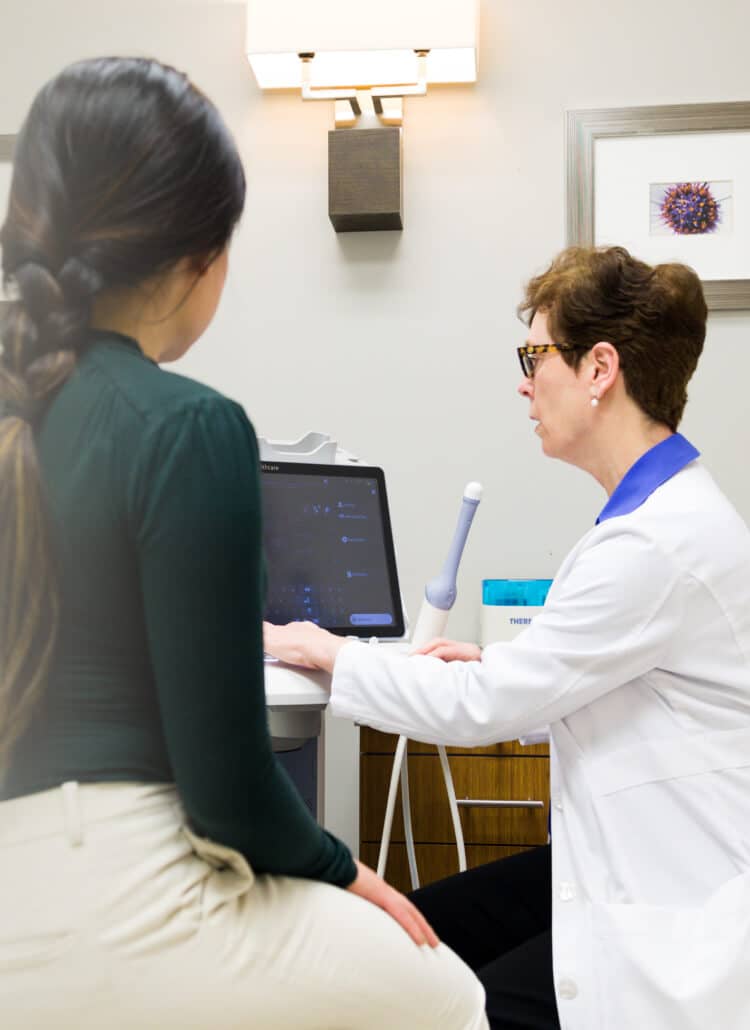Reproductive Health: Knowing Where You Stand
Getting pregnant in your 30s and 40s
At Pacific Fertility Center, we use a number of means to evaluate fertility health. In the case of female infertility, one of the first things we look at is a patient's age -- in particular, the age of her ovarian reserve or, put simply, her egg supply.
An increasing number of women are choosing to have their first child in their mid-30s or later. The challenge for this age group is that with the body's natural aging process, a woman's eggs age as well; and this phenomenon is a significant cause of infertility and miscarriage. Getting pregnant after age 40 is a challenge for women that may have no other impediment to conception.
The decline in fertility potential or 'ovarian reserve' means that not only do the ovaries have fewer eggs to offer, but the eggs they have are of poorer quality, and thus have a harder time producing eggs that are capable of fertilizing and resulting in a healthy pregnancy. (For many years, researchers wondered whether the uterus was also affected by the aging process, but today it is clear that decline in fertility is mostly due to the results of the aging egg.)
The inability to produce healthy, viable eggs often results in lower pregnancy rates as well as higher rates of miscarriage in women over the age of 35. For women over 40, getting pregnant is only half the journey. As miscarriage rates over 40 are 50% and rise quickly with each advancing year.
Hormone testing to assess egg quality
Three simple blood tests can check hormone levels and reveal more information about egg quality. These tests may also help diagnose infertility in a younger woman, who ordinarily would not be experiencing diminished ovarian reserve or poor quality:
- Basal FSH. FSH (follicle stimulating hormone) is the main hormone involved in producing mature eggs in the ovaries. If this test reveals excessive levels of FSH in the body, it is a signal that the brain is trying to boost poorly performing ovaries into action. (In other words, the ovaries may need extra help to make eggs.)
- Estradiol. Estradiol is the most important form of estrogen found in the body, and is responsible for maintaining healthy eggs in a woman's ovaries, as well as for facilitating a healthy pregnancy. If this test shows high levels of Estradiol, it indicates a problem with egg numbers and/or quality.
- Anti-mullerian hormone (AMH). AMH is a blood test that directly measures ovarian reserve. It is produced directly by early stage ovarian follicles. High levels (over 1.0) are favorable, while low levels (less than 1.0) indicate decreased ovarian reserve. AMH may be the best measure of the menopausal transition and ovarian age. It may also be useful in predicting ovarian hyperstimulation syndrome, the effects of chemotherapy, and in determining the treatment of PCOS.
AMH seems a superior predictor of ovarian response compared to other markers, including age, and day 3 FSH and estradiol. It offers similar predictive value compared to AFC. AMH can be drawn at any time in the menstrual cycle, and is not affected by hormonal therapy, including oral contraceptives.
Some of these pre-fertility tests can be done by your primary care physician or gynecologist before seeing a fertility specialists.
Ultrasound evaluation to assess egg quantity
Antral Follicle Count. One of the first tests that is typically performed at an initial patient visit at PFC is a trans-vaginal ultrasound. This ultrasound allows the physician to evaluate the uterus and uterine cavity, and ovaries. Especially if done just prior to ovulation, the ultrasound can be very informative in making sure there are no fibroids or endometrial polyps affecting the uterine lining. Very importantly, the physician can assess the number of small follicles in the ovaries. Ideally, about 10-20 total follicles should be visualized between the two ovaries. If the follicle count is much lower, this may be an indication of declining ovarian reserve.




